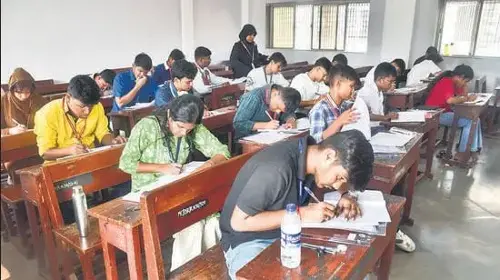
MUMBAI: In my college counselling work every year – between February and April – I observe homes turn into high-pressure environments. It is a make-or-break period for the students that determines the course of their life. But is this the only path to success? How can parents redefine this period, turning it into an opportunity for growth and skilling children for future challenges?
Bearing in mind students’ stress, educationists feel parental support can significantly ease their anxiety and improve academic performance. Sometimes, without understanding the consequences of their words or by withdrawing from the scene, parents can add to the pressure. Alternatively, their sheer presence can be reassuring. Conscious parenting can lead to well guided efforts that reduce overwhelming apprehensions both plaguing the children and parents. Here are five critical areas where parents can help soothe frayed nerves and assist children in navigating this demanding phase.
A famous study titled Stress Mindset Measure by Yale researchers Alia Crum, Peter Salovey and Shawn Achor in ‘The Journal of Social and Psychological Sciences’ showed that our beliefs around stress guide the outcomes. Parents can associate exam time with positive frames of reference, such as improving problem-solving skills, time management and mental toughness. This bracketing can help children develop a growth mindset and see the period as a time to acquire new skills for the future.
Healthy communication between parents and children, where feelings can be articulated without fear of judgment, can reduce anxieties to a large extent. Asking open-ended questions about their day and the topics they find interesting help children feel supported and less stressed. A patient hearing can give them space to meander through their tangled emotions and give voice to their fears and concerns. Avoid comparisons with other siblings, cousins, peers etc. At times, humour is the biggest stress buster.
A student of mine recalled a family ritual during his exam time. Every time he did well, his father would take the whole family out for a small drive to a nearby ice cream shop. That was their way of celebrating his success. Once when he did very badly in his Math test, he waited for a lashing at home; instead, his father took him for ice cream that evening that quietly conveyed his father’s belief in him. He learnt an important lesson: his father’s love and support were not linked to his academic performance.
By steering conversations around efforts and not outcomes, parents can help children acquire an internal locus of control. Putting in sincere efforts and being positive about learning can reduce the focus on marks. If exams are seen as one more step in a series of life challenges, then every step forward is movement in the right direction.
My daughter used to go swimming at odd hours when she was in high school. It was an indication to us that she was dealing with something stressful. Thankfully she had learned a proactive coping mechanism. At times, you need to step back to sharpen focus on demanding tasks. Music, art, sports or even a simple walk (minus a mobile device) are positive ways of dealing with a pressure cooker scenario. They can help reinvigorate a child’s mind and help them approach challenges with a better mindset.
Our children watch us like hawks. We can try our hardest to distill all our life learnings into the best possible words, but they may not listen to us and probably offer eye rolls or monosyllabic answers. However, they will observe everything we do. Most learning happens by osmosis. If we have a positive attitude, then that gets transmitted to children. And, if we are anxious or stressed, we pass that on too. We are surrounded by a chaotic world. A message of optimism that world affairs will take a turn for the better and faith in their abilities can bring in a much-needed hope for a better future.
Recently, a student of mine asked her father to just be there while she focused on her studies. For three hours at night, the father sat in a chair and read a book while the daughter studied for the exams. Even a simple act of ‘being there’ was the best support she needed to feel that she was not alone in this journey and that her parents were with her.
So, take a deep breath and tell yourself that you will make a sincere effort to help your child learn something from this exam period of 2025, and they will come out much wiser on the other side.
Best of luck!
(Hitesh Sharma is the Founder and CEO of Education Counselling service EduPeer.)
(Hitesh Sharma is the Founder and CEO of Education Counselling service EduPeer.)